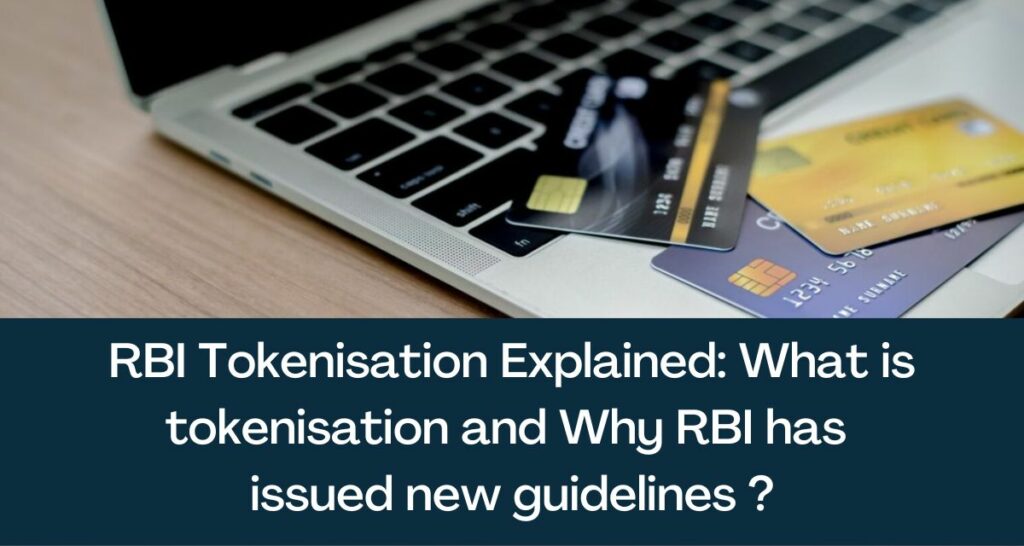RBI Tokenisation: Recently RBI policy has been in the news regarding the extension of Tokenisation Duration for all Debit Cards and Credit Cards for about 3 months to evade malafide function, and disruption chain and to facilitate easy access and smooth way to all concerned cardholders. The RBI New Policy says that no other third party, or entity, can store the COF ( CARD ON FILE ) except the main card issuer and the networks of cards in payments and transactions.
The reason behind the proposing new deadline is nothing more than to meet the request or demand of other traffickers and industries who approached the Reserve Bank of India to alter new guidelines.
RBI Tokenisation Explained
Under this proposal, dealers are not able to access cardholders’ card data and it becomes mandatory for them to apply for the card on file tokens as a substitute for card data information. This allows customers or card carriers to avail detailed information about cards to access E-payment or online transactions.
So this newly implemented proposal of RBI states that TOKENISATION stands for the replacement of real card information with another detail in encrypted form which is coded as TOKEN. This allows specified tokens that can be used to do transactions on cards without the need to contact them.
CARD-ON-FILE ( COF) undertakings entail the holder to stock his own MasterCard or visa transaction data. The card owner proclaims the same dealer to pay the stored MasterCard or Visa account.
BENEFITS OF THE TOKENISATION POLICY OF RBI
- The new token policy reduces the scope of malfunction in the transaction and secures the privacy of cardholders’ data or any private information.
- It also facilitates easy digital transactions in the economy to facilitate e – e-dealings
- It also reduces the scope of fraud done by traders who create unique encrypted codes despite the actual information of the card owner.
- Also, the frequency of erosion of card details or data theft is reduced.
- This process of tokenization is considered safer because it will not enjoy any information with any dealer during the process of the transaction.
- RBI monetary policy brings an easy change in the transaction world by smoothing dealing and agreement in monetary exchange policy.
- Lessen cyber fraud when it comes up to the policy of tokenization.
IMPACT OF NEW RULES
After the announcement of new rules, customers’ privacy was secured by not revealing data or information with any entity or to any merchant during the process of the transaction period. Furthermore, it will also not save the customer data over the e-commerce platform which can be enjoyed by fraud in the future. Encrypted dubbed token helps in preserving their natural information.

NORMS ABOUT NEW RBI POLICY YOU NEED TO KNOW
- RBI encourages their customers to tokenize their cards to pave the norm of convenient transactions and safeguard their card details.
- The central bank also directed payment assemblage, and online dealers to not enjoy any sensitive data of card owners.
- As per the issued norms, consumers are obliged to create specific codes or substitute tokens instead of exposing real card information.
- This policy comes into process on 1st October 2022.
GLANCE AT THE OVERVIEW OF THE TOKENISATION POLICY OF RBI
So, when you go to a platform to purchase something, you use your debit card or credit card where your card information is revealed or saved in that particular platform via e-commerce. This information can be leaked or theft by someone in the future. So, to avoid sensitive data, CENTRAL GOVT’s new tokenization policy carries customers’ larger interest where their card can be substituted with a unique dubbed code as “token” which is used to protect the actual card details.
Not only it entail customer interest, but it also leverages the digital economy by promoting e-commerce, e-marketing, and e-transaction, and erasing the threat of theft or any leakage. Hence RBI encourages its consumers to participate in this new policy to evade the threat of any cybercrime which pays off with monetary loss or any financial damage.
| Homepage | Click Here |